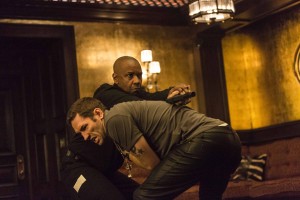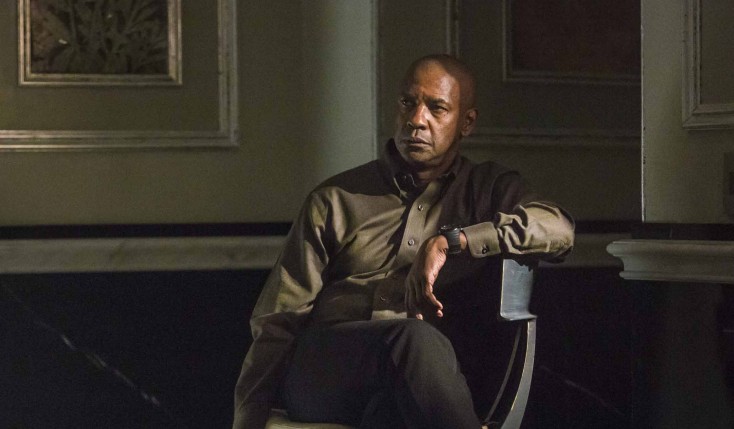
McCall (DENZEL WASHINGTON) takes out one of Slavi’s thugs (NASH EDGERTON) in Columbia Pictures’ THE EQUALIZER. ©CTMG. CR: Scott Garfield.
By ANGELA DAWSON
Front Row Features
TORONTO—Oscar winner Denzel Washington and his “Training Day” director Antoine Fuqua collaborate again on their newest action movie “The Equalizer,” based on the TV series that aired in the mid- to late ‘80s.
Washington, 59, takes on the role of Robert McCall, a former Special Forces soldier who is trying to atone for his past sins by helping those in need while living a quiet life. In the action-drama, he tries to help a girl (Chloe Grace Moretz) who is victimized by Russian gangsters. After failing to buy her freedom, he uses his tactical skills to get the job done.
Washington, a native of Mount Vernon, N.Y., recently spoke about taking on the iconic character, created by Richard Lindheim and Michael Sloan, that was initially portrayed in the TV series by the late British actor Edward Woodward (who died in 2009).
As he does so often in his action films, Washington gets a chance in “The Equalizer” to show off his fighting skills. He’s been boxing for 20 years, even before he portrayed Rubin “Hurricane” Carter in the 1999 biopic about the pugilist.
At the Toronto International Film Festival, Washington spoke about playing the vigilante character, how he has dealt with racism and working again with Fuqua 12 years after their successful collaboration that earned him one of his two Oscars. (Washington’s other Oscar was for his supporting role in the 1991 historic epic “Glory.)
Q: What made you want to do this?
Washington: Great script. Todd Black and Jason Blumenthal developed the material. Bought the rights to the material. It took close to a year to develop it. They called me in-between. I read it 4th of July weekend. It was a quick read. I called them up and said this is Robert McCall calling. It was a real quick decision.
Q: The book you’re holding at the end is Ralph Ellison’s “Invisible Man,” and you can’t watch the movie without thinking of the line, “What did I do to be so black and blue?” Did you work that out with Antoine?
Washington: It was Richard Wenk, the writer who came up with that line.
Q: The movie is set in Boston. Why did that work for you?
Washington: Thirty-something years ago, my wife (Pauletta Pearson Washington) was doing a show in Boston, that she actually did here too, called “The All Night Strut.” She’s doing a one-woman show, so go get tickets. That was a shameless plug. But the reason I brought it up was because the last real fight I had was in Boston. She was doing the show and I came up to visit her, and security tried to suggest that I was a pimp and she was a prostitute and I couldn’t stay in the room. So I knew they weren’t joking and so I hung out. And security came to the door. And it was on. I wasn’t boxing then. I didn’t know how to fight, but I knew how to win. There’s a difference. And, walking to her show one night, being called a ******. (A stranger said) “******, ******, ******. Hey boy.” I was like, “****!” That was the taste I had in my mouth about Boston.
Q: It was like that there for a long time too.
Washington: Is it still? But I did drive around Boston and I drove to the Southie area, and then you cross over into the black area. And then I go, “Oh, now I see,” because all the poor folks are right next to each other, and that’s always the case. The first time I got called a ******, I was in Florida. We were on a balcony and I was about nine. These kids walked by on the beach, and then I went inside the hotel room and said my mother, “why are they saying that?” and she said, “Oh, that’s just somebody worrying about you taking their place.” So she put it in those terms. I didn’t quite know what she was talking about, but that was good enough for me. She said, “That just somebody worried you’re going to take their place.” So it’s like crabs at the bottom of the barrel in southwest Boston, they were all right there at the bottom. “Well, we’re better than you.” So I came there with those kinds of memories, but all of that was just a shameless plug.
Q: Why did you call Antoine Fuqua to direct this project? What are you looking for in that dynamic?
Washington: I’m not looking for anything because I know he already has it. The smartest thing I did was just to call him. He’s an excellent filmmaker. He knows what he’s doing. He knows how to put a film together. He’s open to ideas. He’s a great collaborator and he makes my job easier. I don’t want to go into a film worrying about whether the filmmaker can make the film. I don’t have to think about it. Then we collaborate, obviously and work on the material and try to make the best picture we can.
Q: Does a role like this in an action film require you to take something from yourself? Is the character hard to shake afterwards?
Washington: You take something of everything you do home. Unfortunately, my wife has to deal with it. “Who’s coming in the door today? Oh, it’s Malcolm X today. It’s the white man’s fault today.” (He laughs.) “It’s ‘Training Day.’ It’s everybody’s fault.” As it relates to McCall, we all have a public persona, but we get to see this guy alone, when it isn’t sexy. I’m sure there are some people that are a lot stranger than Robert McCall when they’re home alone. The way he does thing and needs things to be in a certain order. He’s lonely. He’s alone. It’s a testament to the writer and director that we don’t know much about him. We could have had an exposition scene.
Q: Was that scene ever in the script?
Washington: No.
Q: What was the first day like on set?
Washington: I was folding napkins at the diner. That’s a good way in. I always like it on a film when on the first day you just do some walking around. Some filmmakers like to jump right into the action. But I think you should only do that if it’s right. There might be a scene where the character is unsure. I like walking with the camera way back up the block. You’re figuring out. You don’t know. A jazz musician doesn’t know. For an actor, nobody’s played any music yet on the first day. What is the rhythm? I’ve never done a film where in the first take or two I’m not nervous. It’s because you’re not sure. I know there’s more film in the camera or more data in the camera, so I’ve know to let it take time, let it keep running. You’ve got to work it out because you don’t know.
Q: What do you think of the finished film?
Washington: To Antoine’s credit, when I saw the film, there was the movie I thought I was making and then there was the movie I saw. There was a lot more up on screen than what I thought I did because of what he was also doing with the camera. It was a much bigger film than I thought it was.
Q: Do you ever turn something down because you’re afraid of what the material might do to you?
Washington: I made the mistake turning down “Seven,” the Brad Pitt part, because I thought it was (crazy), but then I saw it and I was like (he shakes his head) “oh, no!” But, evidently, it wasn’t for me. It was for Brad all the time. It was too much when I read it, but it was different when I saw it.
Q: Do you ever have any desire to do something lighter, a children’s comedy perhaps?
Washington: Don’t tell me you have a script. Yeah. Sure. Nobody’s called me.
Q: If you could have a superpower, what would it be?
Washington: (He chuckles.) I don’t know. Something positive, something that would help us to get along. Maybe a Jedi mind trick power where I could trick people into being nice to each other.





